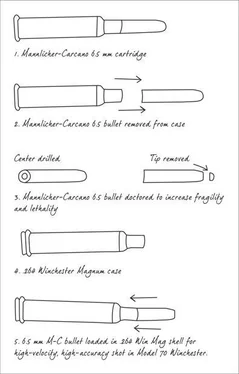Stephen Hunter - The Third Bullet
Здесь есть возможность читать онлайн «Stephen Hunter - The Third Bullet» весь текст электронной книги совершенно бесплатно (целиком полную версию без сокращений). В некоторых случаях можно слушать аудио, скачать через торрент в формате fb2 и присутствует краткое содержание. Жанр: Триллер, на английском языке. Описание произведения, (предисловие) а так же отзывы посетителей доступны на портале библиотеки ЛибКат.
- Название:The Third Bullet
- Автор:
- Жанр:
- Год:неизвестен
- ISBN:нет данных
- Рейтинг книги:5 / 5. Голосов: 1
-
Избранное:Добавить в избранное
- Отзывы:
-
Ваша оценка:
- 100
- 1
- 2
- 3
- 4
- 5
The Third Bullet: краткое содержание, описание и аннотация
Предлагаем к чтению аннотацию, описание, краткое содержание или предисловие (зависит от того, что написал сам автор книги «The Third Bullet»). Если вы не нашли необходимую информацию о книге — напишите в комментариях, мы постараемся отыскать её.
The Third Bullet — читать онлайн бесплатно полную книгу (весь текст) целиком
Ниже представлен текст книги, разбитый по страницам. Система сохранения места последней прочитанной страницы, позволяет с удобством читать онлайн бесплатно книгу «The Third Bullet», без необходимости каждый раз заново искать на чём Вы остановились. Поставьте закладку, и сможете в любой момент перейти на страницу, на которой закончили чтение.
Интервал:
Закладка:
“Okay. Let me know what I can do.”
That was that. Bob spent the three days poring over the three books, cross-checking, trying to find a pattern, looking for something that might tie everything together in a nice little package. A million others had done so before him, and like them, he failed. Nothing. No holes. Oswald did it, that was all, had to be, nothing else worked. Shot from Dal-Tex? On the wildest frontier of the physically possible but unsupported by any evidence whatsoever, except the generalized conceit that the third bullet came from behind and above, and certain windows at Dal-Tex were within the cone of trajectory that the computer age had imposed upon the reality of the event. No known photo existed that showed the upper floors of the building at around 12:30 that day, which would document whether or not a window had been open.
The one new fact was that someone had killed James Aptapton. If so, then maybe it was over something mundane, not the assassination of John F. Kennedy. Maybe Aptapton had divulged his theory, and that guy had recognized it as something new and special, wished it were his, and decided it was his. So he killed him in Baltimore for it. Murders have happened for lesser reasons by far, for pennies, for toys and gym shoes, for pride and prejudice, for honor and glory, for blow jobs and rim shots. Maybe it was Richard himself, though it was hard to feature someone so rumpled and disheveled as a badass killer. But maybe if “Jack Brophy” came clean with Richard, Richard might have some suggestions about who in the assassination community was capable of such a thing.
It was hard to know what to do next.
On the third day, Swagger could tolerate the inactivity no more and took a cab to an address in the suburbs that he’d found on the Internet. It was a huge sporting goods place called Outdoor Warehouse, and it lived up to its claim of holding nearly everything indoors that could be used outdoors. That included the hunting department, where, among the beautifully crafted new rifles and the black plastic assaulters and the endless variations of 9 mm, .38/.357s, and .45s in the gleaming showcases, he found a wide-ranging aisle of ammunition offerings and, between the 6.5 Creedmore and the 6.5 Swede, some boxes of 6.5 Mannlicher-Carcano. It was Czech or something, from an outfit called Prvi Partizan, but in the requisite 162-grain load. It was surprisingly cheap, at around fifteen dollars, and the thirteen-year-old behind the cash register up front displayed no sense of irony at the sight of a man buying a box of six-five Carc in Dallas, Texas.
Back in the room in the Econo Lodge, Bob opened the box, took out the twenty cartridges, and brought one close to his eye. It looked like a small blunt-nosed missile, all gleaming and reflective in the fluorescent light. The bullet was abnormally long, given the length of the case, and spoke of the nineteenth century with its blunt tip, which was the latest thing in the 1890s.
He looked at it from a dozen angles, trying to uncover its secrets. It was a lynchpin of sorts, close enough to the original to stand in for the bullet that LHO had nominally used.
Though it was the magic bullet, today it didn’t look magic, just comically old-fashioned, with that rounded “meplat,” the technical term for bullet point. He recalled the number of wounds it had inflicted, hitting the president high in the back, passing through him, hitting Governor Connally, passing through him, passing through his wrist and smacking his leg, all without doing much damage to itself. From a certain angle that bullet – Warren Commission Exhibit No. 399 – did look as “pristine” as the one three inches from Swagger’s eyes. But Bob recalled that from other angles, it became clear that the base of the bullet was severely mangled, crushed out of round by some impact, with core lead extruded from the interior by the impact. It was far from pristine but at the same time suspiciously intact.
Swagger had a melancholy fund of knowledge on what bullets did to bodies, his own and others’. To him, it was not nearly so mysterious when he considered that the bullet did not strike bone until it left the governor’s body, when it struck his wrist, fracturing it, by which time it had slowed considerably from its initial muzzle velocity of two thousand feet per second and lost most of its power to crumple or break when colliding with hard structures.
Swagger couldn’t get away from the old-fashionedness of it. It was old-fashioned by the standards of 1963. It was eighty-two years old in theory and design when it struck the president. Lots of folks missed that; it was just another bullet to them.
Another way to look at the bullet was to consider its origin and purpose. Too many fools had written about the event without reference to those two issues. Too many fools thought a bullet was just a heavy piece of lead screwed into a cartridge and sent arbitrarily on its way. In fact, even in 1891 bullets and their design and performance were among the most overengineered items in the human inventory, thought about hard and mathematically; long before men had indoor plumbing or hot running water, they had substantive mathematical treatises on ballistic performance, principles, and laws. Ballistics were always the first thing the state’s mind turned to, not the last.
That bullet, like the one in its brass casing in his hand now, weighed 162 grains and consisted of copper gilding of unusual thickness over a lead core, 1.25 inches in length with a round nose. It was designed after great research and experimentation to perform a certain military job, which the Italian general staff believed would be of importance in the late nineteenth and early twentieth centuries. There was nothing arbitrary about it. It wasn’t designed just “to kill” but to kill a particular enemy in a particular environment.
It occurred to Swagger that to understand WC399, he had to understand the military realities of the Italian army in 1891, when the round was adopted as the standard infantry cartridge, during the general European upgrade of that era from single-shot muskets to magazine-fed bolt actions, such as the Mauser K98, the French Lebel, the British Enfield, and eventually, the American Springfield.
Who was the Italian general staff planning to fight, and in what environment? The Italians have never been expansionist, and Mussolini was thirty years down the pike. They were not great colonizers with an overseas empire to safeguard, like the British or the Germans. Despite two pathetic forays into Africa, they did not see their troops fighting indigenous forces in Asia, India, or the Pacific. What they imagined was protecting the good life that was lived in their beautiful country, with its abundance of resources, its grapes, its pasta, all roasted by a warm sun.
The Italians of 1891 understood that the important battles to come would be defensive in nature. They would not invade. They would be invaded. Their task was to stop invasion in its tracks. Where would such a battle take place? The amphibious landing had not yet been attempted, much less perfected, so it seemed likely a foe – German or Austrian, most likely – would come overland. If you look at the map, that tells you much: the invasion would have to come through the Alps. It would be a mountain war.
In such a battle, who would an Italian soldier be trying to kill and at what range? Well, Swagger reasoned, the nature of mountain war is that the ranges would tend to be long. Just look at Afghanistan and its five-hundred-yard firefights. Mountain war would involve shooting uphill, downhill, across valleys. Except in rare instances, there’d be little hand-to-hand combat; targets could be expected in the two-to-four-hundred-meter range. That would dictate a bullet noted for its accuracy, which in turn would result in a long, thin bullet, so that the rifling could be counted upon to give efficient spin, with an unusual density so as to resist the unpredictable spurts of wind found up high. It occurred to him that was an excellent description of the M-C 6.5 in the ideal, although Italian manufacturing practices may have meant that the ideal was seldom achieved.
Читать дальшеИнтервал:
Закладка:
Похожие книги на «The Third Bullet»
Представляем Вашему вниманию похожие книги на «The Third Bullet» списком для выбора. Мы отобрали схожую по названию и смыслу литературу в надежде предоставить читателям больше вариантов отыскать новые, интересные, ещё непрочитанные произведения.
Обсуждение, отзывы о книге «The Third Bullet» и просто собственные мнения читателей. Оставьте ваши комментарии, напишите, что Вы думаете о произведении, его смысле или главных героях. Укажите что конкретно понравилось, а что нет, и почему Вы так считаете.












